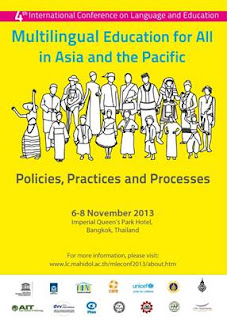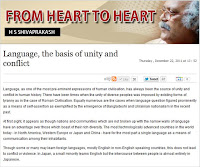[MLE] 4th International Conference on Language Education; 6-8 November 2013 in Bangkok

Dear multilingual Education friends, Unesco Bangkok send out the below announcement. It looks like an exciting conference again. There is lots that can be shared from India so we hope many can attend. Asia MLE WG is organizing 4 th International Conference on Language Education – Multilingual Education for ALL in Asia Pacific: Policies, practices and processes on 6-8 November 2013 in Bangkok, Thailand . The conference brings together MLE partners to increase understanding of the importance of expanding access to effective MLE and strengthen momentum for MLE in Asia and the Pacific region. The conference will facilitate the exchange of effective practices and experiences, link MLE theory to practice and foster policy dialogue. The conference will serve as a platform for forward-looking






